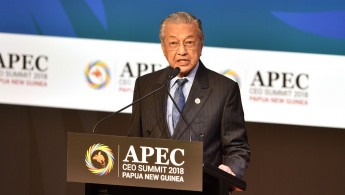Malaysia and Australia in war-of-words over possible Jerusalem embassy move
A growing rift has continued between Australia and Malaysia over Canberra's 'pro-Israel' stance on Jerusalem.
2 min read
Malaysian PM Mahathir said that an embassy move would fuel terrorism [Getty]
Australia's treasury chief on Friday alleged that Malaysia's prime minister has a history of anti-semitic remarks amid a growing rift between the two countries over Canberra's announcement that it could move its embassy in Tel Aviv to Jerusalem.
"The Malaysian prime minister has form," Australia's Treasurer Josh Frydenberg said in a radio interview. "He has called Jews hook-nosed people. He has questioned the number of people that have been killed in the Holocaust."
Frydenberg's remarks follow the ASEAN summit which took place in Singapore on Thursday, where Malaysian leader Mahathir Mohamad raised the Jerusalem issue with his Australian counterpart Scott Morrison.
Morrison suggested the embassy move in October, triggering outrage from Muslim-majority countries Malaysia and Indonesia.
"I pointed out that in dealing with terrorism, one has to know the causes," Mahathir told reporters following the two leaders' meeting. "Adding to the cause for terrorism is not going to be helpful."
Indonesia, which neighbours Malaysia, has so far stalled a key free trade agreement with Australia in response to Canberra's stance on Jerusalem. Both countries have no official diplomatic ties with Israel.
Earlier in the year, Australia had expressed confidence that the deal would be completed by the end of 2018, however, conceded last week that the agreement was now in Indonesia's hands.
Jakarta has also expressed concern over the embassy review and suggested it might upset plans for a free trade agreement with Australia, though Morrison has said the issues were not conflated during recent talks he had with Indonesian President Joko Widodo.
Frydenberg's remarks follow the ASEAN summit which took place in Singapore on Thursday, where Malaysian leader Mahathir Mohamad raised the Jerusalem issue with his Australian counterpart Scott Morrison.
Morrison suggested the embassy move in October, triggering outrage from Muslim-majority countries Malaysia and Indonesia.
"I pointed out that in dealing with terrorism, one has to know the causes," Mahathir told reporters following the two leaders' meeting. "Adding to the cause for terrorism is not going to be helpful."
Indonesia, which neighbours Malaysia, has so far stalled a key free trade agreement with Australia in response to Canberra's stance on Jerusalem. Both countries have no official diplomatic ties with Israel.
Earlier in the year, Australia had expressed confidence that the deal would be completed by the end of 2018, however, conceded last week that the agreement was now in Indonesia's hands.
Jakarta has also expressed concern over the embassy review and suggested it might upset plans for a free trade agreement with Australia, though Morrison has said the issues were not conflated during recent talks he had with Indonesian President Joko Widodo.
"It (the FTA) can be signed anytime, but when you will sign it... depends on Australia's position" on the embassy issue, Indonesian Trade Minister Enggartiasto Lukito told reporters last week.
Indonesian Foreign Minister Retno Marsudi also "stressed that if Australia insists on moving its embassy to Jerusalem, the signing will be delayed", Lukito added.
If Canberra moves its embassy to Jerusalem, it would follow in the steps of President Donald Trump's administration, which turned its back on decades of US policy last December by recognising Jerusalem as Israel's capital. In May, it moved the US Embassy from Tel Aviv to the disputed holy city.
The decision angered the Muslim world and was seen as setback for Palestinian aspirations for statehood.
Palestinians see east Jerusalem, captured by Israel in the 1967 war, as the capital of a future independent state.
The decision angered the Muslim world and was seen as setback for Palestinian aspirations for statehood.
Palestinians see east Jerusalem, captured by Israel in the 1967 war, as the capital of a future independent state.





 Follow the Middle East's top stories in English at The New Arab on Google News
Follow the Middle East's top stories in English at The New Arab on Google News
![Israeli forces ordered bombed Gaza's Jabalia, ordering residents to leave [Getty]](/sites/default/files/styles/image_330x185/public/2176418030.jpeg?h=a5f2f23a&itok=_YGZaP1z)

